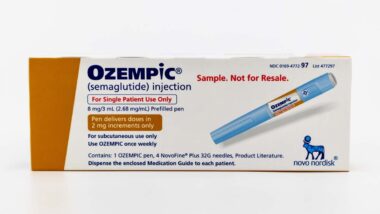Top Class Actions’s website and social media posts use affiliate links. If you make a purchase using such links, we may receive a commission, but it will not result in any additional charges to you. Please review our Affiliate Link Disclosure for more information.
UPDATE:
- The province has agreed to continue the injectable opioid agonist treatment for existing participants, issuing a $6 million grant.
11 residents of Alberta have filed a lawsuit against the government after it cut funding to a program that offers injectable opioid agonist treatment (iOAT). The program is scheduled to end next year following budget cuts starting March 31, 2021. However, the province has reportedly agreed to continue the program for some patients.
iOAT clinics in Edmonton and Calgary that offer a safe haven for struggling addicts to get treatment are scheduled to close if the lawsuit isn’t successful.
Closing Alberta Treatment Facilities Provokes iOAT Lawsuit
The iOAT lawsuit statement of claim was filed on Sept. 30, accusing the government of infringing on clinic patients’ charter rights by putting their lives and personal safety at risk.
According to the iOAT lawsuit, the government is denying recovering addicts of lifesaving treatment, resulting in discrimination.
The 11 Albertans who launched the iOAT lawsuit have initiated the legal action to call on the government to stop the opioid treatment clinic closures and continue providing help for present and future recovering addicts.
According to the iOAT lawsuit’s statement of claim, the opioid clinics’ eventual closures are already affecting patients, and some have already relapsed by using drugs.
Opioid Treatment Clinic Closures May Cause Deaths, Lawsuit Alleges
The iOAT lawsuit details the specifics of the 11 addicts who are devastated by the opioid treatment clinic closures. Each of the 11 individuals has experienced their own traumas, including child abuse, homelessness, prison time, and drug overdoses.
Three of the 11 recovering addicts in the iOAT lawsuit said they would be dead if not for the opioid treatment clinics. Plaintiff Cynthia, who decided to omit her last name, says since going to treatment, she is working part-time and attending church.
“I’m very afraid that if this program closes I’m not going to have other options,” Cynthia said. “I’ve tried other programs…and it has not helped it. I’m very afraid that my life will be cut short if this program ends up closing,” she said according to Edmonton News.
Plaintiffs Keitha Cote and Kevin Madsen reportedly agreed with Cynthia. Cote started abusing opioids after suffering from a flesh-eating disease and having hernia surgery and Madsen spent time homeless and doing drugs.
“Since joining iOAT, I have an apartment, I have a future, my health is a lot better, everything is just looking up,” Madsen said, reported by Edmonton News.
According to CBC News, the iOAT lawsuit’s statement of claim says, “The plaintiffs suffer from the most severe form of opioid use disorder, which left untreated will result in serious adverse health and effects, including premature death.”
The statement of claim continues, “To avoid an abrupt and potentially life-threatening transition from iOAT to street opioid use, some iOAT patients have resumed street opioid use in a gradual manner to safely facilitate their transition off of iOAT. In doing so, iOAT patients are exposing themselves to serious dangers associated with street opioid use, including the risk of death,” reports CBC News.
Weeks before the iOAT lawsuit was launched, more than 600 physicians, frontline workers, and advocates submitted an open letter to the province to keep the Alberta opioid clinics open.
Opioid Crisis in Alberta May Surge Without Treatment Clinics
There is an inordinate amount of opioid drug use in Alberta, and compacted with the ongoing pandemic, the opioid treatment clinic closures could leave individuals particularly susceptible to relapsing, or picking up a new drug habit.
What’s more, there is an increased amount of contaminated street drugs in Alberta, according to CBC News.
iOAT lawsuit representing lawyer Avnish Nanda believes the opioid treatment clinic closures will increase deaths by drug overdose. According to Nanda, there are approximately 100 enrolled patients and there are additional people who are waitlisted. He also added that the determination to supply or refuse opioid treatment should be the decision of medical professionals.
In a news conference, the iOAT lawsuit lawyer said, “How many people have to die for you to assert that your ideology is worth it?,” according to CBC News.
He added, “Three Albertans are dying every day and even one of those Albertans can be saved by iOAT then we should allow this program to continue.”
Although the iOAT lawsuit may take years to come to a solution, the Alberta government can still decide to stop the opioid treatment clinic closures. The iOAT lawsuit is after an emergency injunction that will stop all opioid clinic patients from being turned away until the conclusion of the lawsuit.
While an iOAT lawsuit has been launched in Alberta, the Alberta town Grande Prairie has filed a $10 billion class action lawsuit against drug makers. The opioid class action lawsuit accuses drug makers and distributors of fueling the opioid epidemic in Alberta, negatively impacting residents and costing taxpayers money.
The town of Grande Prairie alleged that more than 40 drug manufacturers incited the already prevalent opioid crisis by using false advertising of drugs.
Program to Remain for Existing Clients
Alberta has reportedly agreed to continue funding the program for existing iOAT clients for an additional two years under a $6 million grant. Alberta Health employees told CBC News that the grant funds would only be available to provide the same level of care to existing clients and no new clients would be allowed in the program.
“Today is a very good day and I feel like a lot has been accomplished,” one of the plaintiffs told CBC, according to a report on March 2.
“It’s been a nightmare not knowing whether or not it’s going to close or open,” he continued. “We’re talking about the difference between life and death here.”
There are reportedly a total of 88 people in the program: half in Edmonton and half in Calgary. An anonymous health services employee also told CBC that, starting at the end of March, the name of the program, iOAT, would end, though services would remain the same for existing clients under the grant.
Click on the “Follow Article” at the top of this page to get the latest updates about the Alberta iOAT lawsuit by using your free Top Class Actions account.
The plaintiffs in the iOAT lawsuit are being represented by Avnish Nanda at Nanda & Company.
Do you or a loved one seek treatment at one of the Alberta clinics on the brink of closure? Do you think the iOAT lawsuit will have any effect on the government’s decision to shut down the opioid treatment clinics? Share your thoughts in the comments section below.
Read More Lawsuit & Settlement News:
ATTORNEY ADVERTISING
Top Class Actions is a Proud Member of the American Bar Association
LEGAL INFORMATION IS NOT LEGAL ADVICE
Top Class Actions Legal Statement
©2008 – 2024 Top Class Actions® LLC
Various Trademarks held by their respective owners
This website is not intended for viewing or usage by European Union citizens.


















